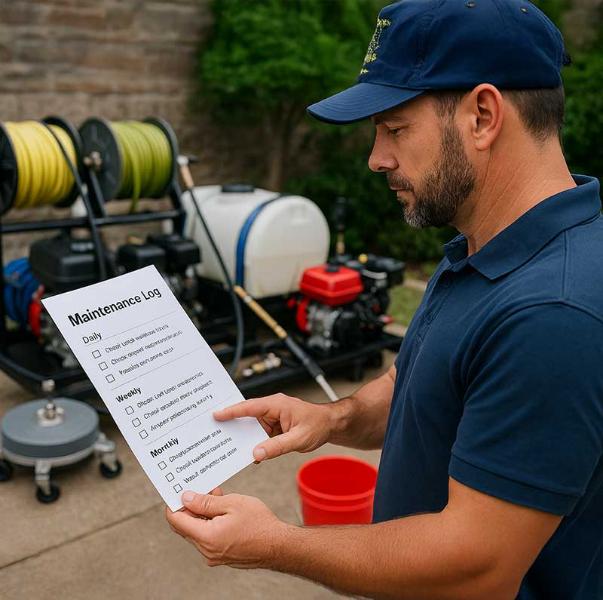Daily, Weekly, and Monthly Maintenance Routines for Wash Professionals
Proper maintenance is essential for the longevity and reliability of professional washing equipment. Whether you operate a soft wash system, a pressure washer, or a full-service mobile rig, staying consistent with maintenance can prevent costly downtime, extend equipment life, and ensure job readiness.
This guide outlines the key daily, weekly, and monthly maintenance routines that every wash professional should follow.

Daily Maintenance Routine
The goal of daily maintenance is to ensure your equipment is clean, safe, and ready to perform. These tasks are quick and designed to prevent small issues from becoming serious problems.
Before Each Job:
- Inspect fuel and oil levels on gas-powered engines and pumps
- Examine hoses for cracks, kinks, or visible wear
- Clean or replace nozzles and tips to avoid spray pattern issues
- Check that SH (sodium hypochlorite) and water tanks are secure and properly vented
- Confirm the battery for 12V systems is charged
After Each Job:
- Rinse all chemical lines with clean water
- Flush remaining chemical mix from tanks and plumbing (especially SH)
- Clean downstream injectors, proportioners, and hose ends
- Wipe down equipment to prevent corrosion and grime buildup
- Document or report any performance concerns
Recommendation:
Keep a printed “Job Complete” checklist on your trailer or service vehicle for consistency
Weekly Maintenance Routine
Weekly tasks involve deeper inspections and minor preventative adjustments.
Tasks to Complete:
- Lubricate hose reel bearings (if applicable)
- Inspect all quick-connects and replace worn O-rings
- Clean or replace engine air filters
- Top off fluids (pump oil, soft wash system lubricants)
- Check battery terminals and clean any corrosion
- Reorganize and clean trailer or truck-mounted gear layout
Optional Enhancements:
- Rinse the interior of your water tank
- Replace fuel filters on gas engines
- Verify accurate pressure readings on gauges
Monthly Maintenance Routine
Monthly maintenance ensures your equipment is functioning optimally and helps catch early signs of wear or failure.
Key Items:
- Drain and replace engine and pump oil according to manufacturer recommendations
- Inspect SH tank and plumbing for degradation or leaks
- Conduct full-system test sprays under load
- Check trailer tires for pressure and tread
- Inspect trailer wiring, lights, and hitch assembly
- Review chemical stock; dispose of degraded SH or additives
Additional Suggestion:
Schedule a monthly cleaning of personal protective equipment such as respirators, gloves, and eyewear.
| Task | Daily | Weekly | Monthly |
|---|---|---|---|
| Rinse chemical lines | |||
| Inspect hoses | |||
| Check fuel and oil levels | |||
| Replace pump/engine oil | |||
| Inspect trailer tire pressure | |||
| Clean air filters | |||
| Conduct system test spray |
Why Maintenance Matters
Adhering to a structured maintenance plan results in:
- Fewer emergency repairs
- Improved job site efficiency
- Greater return on investment from equipment
- Enhanced reputation due to fewer service delays
Professionals who follow a routine often experience fewer breakdowns, more consistent results, and better overall equipment performance.
Conclusion
Maintenance is not simply a best practice—it is an operational necessity. A disciplined approach to equipment care enables contractors to focus on delivering quality service, not repairing preventable damage.
Implement these routines, adjust as needed for your equipment model, and create a maintenance schedule that works for your team.
Call to Action
LNI Equipment carries a full line of:
- Replacement oil and filters
- Repair kits and quick-connect hardware
- SH-safe rinse systems and fittings
Visit: lniequipment.com
Call/Text: 732-522-8880
Email: contact@lniequipment.com
Related Reading:
